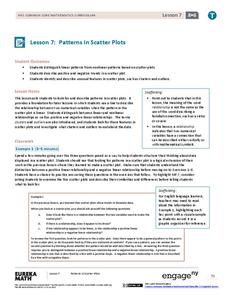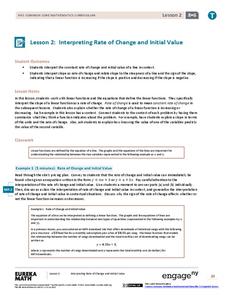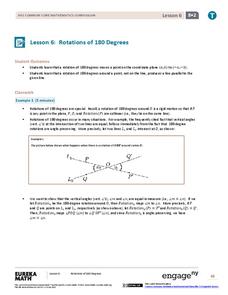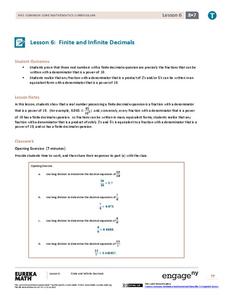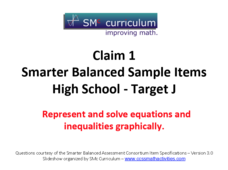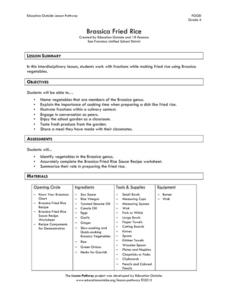EngageNY
Linear Functions and Proportionality
Connect linear equations, proportionality, and constant rates of change to linear functions. Young mathematicians learn how linear equations of the form y = mx + b can represent linear functions. They then explore examples of linear...
EngageNY
Patterns in Scatter Plots
Class members investigate relationships between two variables in the seventh installment of a 16-part module that teaches scholars how to find and describe patterns in scatter plots. Young mathematicians consider linear/nonlinear...
EngageNY
Numbers Raised to the Zeroth Power
What in the world is the zeroth power? Examine the patterns of exponents as they apply to the zeroth power. Scholars apply the zero property to simple exponential expressions in this fourth lesson plan in a series of 15. The examples...
EngageNY
Interpreting Rate of Change and Initial Value
Building on knowledge from the previous lesson, the second lesson in this unit teaches scholars to identify and interpret rate of change and initial value of a linear function in context. They investigate how slope expresses the...
EngageNY
Magnitude
Build an understanding of the powers of 10. Pupils investigate the results of raising 10 to positive and negative powers. They relate this understanding to the magnitude these powers represent in this seventh lesson of 15.
EngageNY
Rotations of 180 Degrees
What happens when rotating an image 180 degrees? The sixth lesson in the series of 18 takes a look at this question. Learners discover the pattern associated with 180-degree rotations. They then use transparency paper to perform the...
EngageNY
Definition of Congruence and Some Basic Properties
Build a definition of congruence from an understanding of rigid transformations. The lesson plan asks pupils to explain congruence through a series of transformations. Properties of congruence emerge as they make comparisons to these...
EngageNY
Angles Associated with Parallel Lines
Explore angle relationships created by parallel lines and transversals. The 13th lesson of 18 prompts scholars use transparency paper to discover angle relationships related to transversals. Learners find out that these angles pairs are...
EngageNY
Finite and Infinite Decimals
Explore the patterns of fractions that produce finite and infinite decimals. The sixth lesson of the series asks learners to determine a similar feature of fractions that produce finite decimals. Using the patterns, pupils create...
EngageNY
Cones and Spheres
Explore methods for finding the volume of different three-dimensional figures. The 20th instructional activity in the 25-part series asks learners to interpret diagrams of 3-D figures and use formulas to determine volume. Scholars must...
EngageNY
Least Common Multiple and Greatest Common Factor
Find the common denominator between prime factors, factor trees, and the distributive property. Scholars learn to find the least common multiple and greatest common factor of pairs of numbers. They rotate through stations to connect...
EngageNY
The Relationship Between Absolute Value and Order
Order up a resource on absolute value and order. The 12th installment of a 21-part module investigates the relationship between absolute value and the order of numbers on a number line. Scholars determine how the actual values and the...
EngageNY
The Relationship of Division and Subtraction
See how division and subtraction go hand-in-hand. The fourth installment of a 36-part module has scholars investigate the relationship between subtraction and division. They learn using tape diagrams to see that they can use repeated...
District 158
Plan an Adventure
For kids, taking a vacation is all fun and games, but after completing this pre-algebra project, they'll have a whole new appreciation for the planning that makes these trips possible. Given a budget of $5,000 to spend on purchasing the...
Charleston School District
Identifying Irrational Numbers
These numbers have some personality! Are they rational or irrational? The lesson examines the definitions of rational and irrational numbers and shows examples of how to identify them.
CCSS Math Activities
Smarter Balanced Sample Items: High School Math – Target J
Good graphs make solving systems simpler. Pupils answer 18 questions shown in a PowerPoint presentation as part of the Claim 1 Item Slide Show series. By considering these questions, they review the concepts of graphing equations and...
Curated OER
Facts That Add to 4
In this addition worksheet, students write addition sentences that equal 4. Students use the 5 spaces surrounding the number four in the center of the graphic organizer and create equations with 4 as the sum.
Curated OER
Facts That Add to 5
In this addition worksheet, students write addition sentences that equal 5. Students use the 5 spaces surrounding the number four in the center of the graphic organizer and create equations with 5 as the sum.
jc-schools
The Expository Essay
Did you ever create an awesome graphic organizer only to find that your class was completely baffled by how to use it? This resource not only provides you with a great graphic organizer for a standard five-paragraph essay, but also...
Education Outside
Brassica Fried Rice
Here's a delicious way to engage fourth graders into working with fractions. Kids chop brassica or cruciferous vegetables, measure the required ingredients, and add them to cooked rice to produce a delicious treat.
Flipped Math
Calculus AB/BC - Derivatives of cos(x), sin(x), e^x, and ln(x)
The shortcuts are not just for polynomial functions. Pupils learn the derivatives of the two basic trigonometric functions, cosine and sine. The video provides the derivatives for exponential and logarithmic functions. Learners work...
Flipped Math
Calculus AB/BC - The Power Rule
There has to be a quicker way. Pupils learn the power rule that allows for a shortcut to take the derivative of terms to a power. Using the newly found rule, scholars find the slope of the tangent line to a function at a given x value....
EngageNY
Getting a Handle on New Transformations 2
Use 2x2 matrices to move along a line. The second day of a two-day lesson is the 28th installment in a 32-part unit. Pupils work together to create and solve systems of equations that will map a transformation to a given point. The...
Oklahoma State University
Hairy Heredity
Young scholars learn that heredity comes down to the flip of a coin with this cross-curricular math and science lesson. Using smiley faces as a model, students toss coins to determine which dominant or recessive traits will be passed on...



